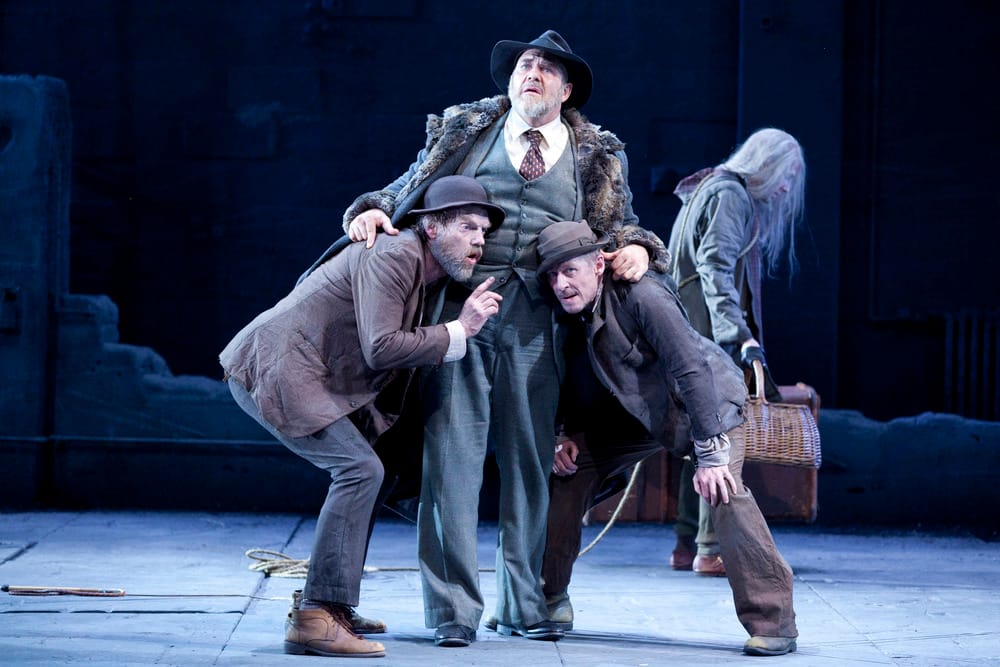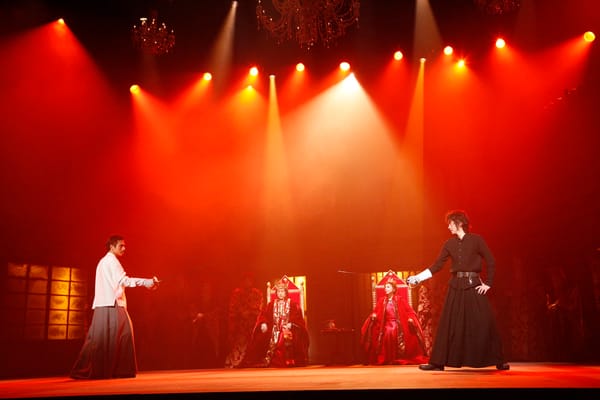Meaning in Madness: Barbican's Celebration of Beckett
Fred Fyles heads to the Barbican, where they are currently celebrating the work of Samuel Beckett, to watch Lessness and Waiting for Godot

The great Irish dramatist and writer Samuel Beckett, whose oeuvre the Barbican Centre are celebrating through the month of June, said that he wrote because writing was all that he was good for. Far be it from me to disagree with him, but the man greatly misestimated his talents. Beckett’s writing does not really exist in the realm of the written word; instead, what he was exceptionally talented at was creating an atmosphere. His works may be endlessly interpreted by generation upon generation of scholars, eager to eake out more and more meaning from every syllable, but it is upon the stage that his words really come to life, forcing us to sit up, pay attention, and be awed.
Perhaps nowhere is this more apparent than in Olwen Fouéré’s interpretation of Lessness, a short story translated from the original French work, Sans. The work, which is a pair of seemingly random arrangements of 60 sentences, when seen on paper, is really nothing more than a jumble of repeating words and phrases. But when transported into the Barbican’s Frobisher Auditorium, a deeply intimate venue, Fouéré’s reading allows us to make sense of the piece.
over the next 35 minutes she lures us into a trance through the sheer power of Beckett’s mind
Sitting at a desk, bare but for a anglepoise-style lamp, Fouéré faces the audience, her white hair pushed back behind a utilitarian pair of headphones. Above her, a wide screen of static is projected against the wall, flickering to and fro. The piece begins, and over the next 35 minutes she lures us into a trance through the sheer power of Beckett’s mind. With certain phrases coming to prominence - little body; only upright; true refuge - the mechanical delivery of the lines weaves an imaginary tapestry in the minds of the viewer. Fleeting and ephemeral, this vision, one of desolation, longing, and alienation, somehow manages to be both concrete and ungraspable, something accentuated by the minimal drone soundtrack, composed by Phill Niblock. The overall effect is heady and powerful, creating a headspace for the audience, which I can only describe with the word ‘trippy’ - a term that simply does not do justice to what was going on in the room.
It is not clear whether Fouéré is reciting from memory, or if she is being fed the lines one-by-one through her headphones.
It is not clear whether Fouéré is reciting from memory, or if she is being fed the lines one-by-one through her headphones. It’s not even clear whether this is the original work, or one of the innumerable arrangements of the sentences that are possible. Fouéré, for her part, refuses to give the game away, delivering her lines in a flat style that brings to mind the American artist Laurie Anderson. Born in Ireland to French parents, Fouéré’s upbringing makes her perhaps the perfect person to interpret Beckett’s work, understanding the nuances of both the French and Irish components of his mind; she certainly doesn’t disappoint, conjuring up a ruined mental landscape that seems to go on forever.
While Fouéré manages to generate a desolate wilderness in the mind of the audience, such an effort is not needed for those going to see the Sydney Theatre Company’s production of Waiting for Godot, for which the Barbican’s Theatre has been turned into an actual wasteland. The stage, bare but for a naked tree which twists upward to the rafters, cutting a sharp line through the space, forms the setting in which the characters merely wait. And wait. And wait. Not for nothing did critic Vivian Mercier describe it as ‘a play in which nothing happens, twice’. And yet, somehow it seems that everything happens. I will not try to elaborate on the meaning of the play; there is no point, and Beckett plays more on the nerves and heartstrings of the audience, instead of functioning as a cerebral exercise. All I need to say is that by the time the play is over, we are just that much closer to understanding the human condition.
The small cast, comprising of four main members, is incredibly tight: Richard Roxburgh lends a subtle Australian brogue to his put-upon Estragon, and finds a formidable sparring partner in his companion Vladimir, played by Hugo Weaving. The pair bicker and squabble, enacting out various games, passing the time as they wait for the unseen titular character. How long they have been waiting, how long they will continue to wait, remains a mystery, furthering the sense of alienation the audience finds themselves on the receiving end of. Philip Quast plays the role of Pozzo, who seems to be trapped in his relationship with the put-upon Lucky. Dragged this way and that, near-mute throughout the majority of the play, until he vomits forth a stream of consciousness at the end of Act I, Lucky is perhaps one of the most difficult characters to get right, but Luke Mullins brings an extraordinary physicality to the role.
While the setting pays homage to the idea of a post-apocalyptic wasteland, set designer Zsolt Khell also toys with the idea of the nature of theatre - with its exposed backdrop, the stage is clearly just that: a stage. Perhaps Khell is trying to emphasise the idea that the theatre is a dead art; or maybe, as Pozzo says, ‘they give birth astride a grave’, and the instantaneous gleam of light that is life is akin to a performance; either way the staging has a powerful effect on the play’s meaning and atmosphere. In her costume design, Alice Babbage - and perhaps I am reading too much into this - seems to have taken a uniquely Australian direction: the down-on-their-luck characters lurch around the stage in old boots and musty jackets in a spectrum of grey, looking like some early settlers, lost in the bleak outback.
oxburgh and Weaving form a brilliant duo, with Vladimir providing a witty foil to Estragon’s more grounded grumbles
The English translation of Waiting for Godot is given the subtitle ‘a tragicomedy in two acts’, and in this production the comedic elements are certainly highlighted. Capering around the stage, Roxburgh and Weaving form a brilliant duo, with Vladimir providing a witty foil to Estragon’s more grounded grumbles. The production is clearly indebted to the theatrical tradition of slapstick, and the early physicality of actors such as Buster Keaton, which provides a rich seam of imaginative influences for director Andrew Upton to mine. At some points, however, it feels that this aspect has taken precedence over the tragic elements of the script, with the themes of isolation, loneliness, and general bleakness taking a back seat. This does provide a warmth to the play, which I have not seen in other versions, but - particularly on a warm summer night - sometimes one requires a little bit of chill.
Owen Fouéré’s Lessness was on at the Barbican’s Frobisher Auditorium from 5th - 8th June
The Sydney Theatre Company’s Waiting for Godot is on at the Barbican Theatre until 13th June. Tickets from £16, available online
The Barbican’s International Beckett Season continues until 21st June.






